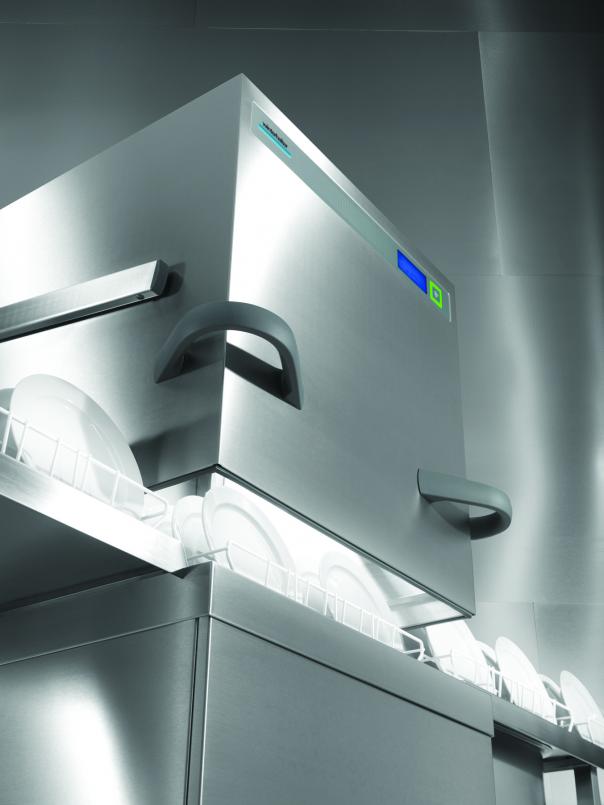
Warewasher manufacturers dealing with the cost sector are well aware of the special needs of caterers, offering large machines that can cope with huge throughput in a short space of time. Flight and rack models work well as the ability to quickly handle high throughput is necessary because many operations have staff for only a short window in the middle of the day to keep labour costs down.
Equipment is designed to meet these needs while offering top results and cutting down on the use of water, chemicals and power. Nick Falco, managing director of Dawson Foodservice Equipment, which brings the Italian Comenda range of warewashers to market, says he is excited about the recently introduced NE flight and AC3 rack conveyor systems.
“The flight machines give operators a payback, due to the savings on energy, water and chemicals, of around three and half years. The option of Speed 2 and Speed 3 on the NE models speeds the process up and that’s what gives the potential for large throughput.
“We can also offer 75% water and 50% energy saving not only compared with our previous machine but also against comparable models in the industry as a whole, as our proven consumption savings are making waves against the big boys.”
The NE flight machine range uses just 33ml of water per dish and can process up to 11,000 dishes an hour.
“It uses the lowest volume of water ever seen on a machine in this class, amounting to just 0.5L a rack. These impressive savings are attributable to the company’s patented Multirinse invention, which is available on all flight machines and a version as standard on the AC3 range of rack transport dishwashers.”
John Shepherd, UK and Ireland country manager for Wexiödisk, says: “Warewashing  machines have taken major steps forward in recent years, focusing on providing caterers with environmentally friendly and energy-efficient equipment capable of offering a consistent, high-quality wash, time and time again.
machines have taken major steps forward in recent years, focusing on providing caterers with environmentally friendly and energy-efficient equipment capable of offering a consistent, high-quality wash, time and time again.
“At the same time, developments to capacity and consistency of washers have resulted in some of the most effective and efficient appliances ever manufactured.
“Our WD-151, for example, is capable of washing 70–250 standard baskets am hour and is more than capable of handling the demand of busy cost sector establishments.
“Using our patented double-rinse technology, the WD-151 achieves a superior result with minimal water consumption, something that is further enhanced by the use of the WD-PRM60, a pre-rinse appliance that reuses the wastewater from the warewasher to rinse incoming dishes.”
He adds that cost sector caterers should also consider the use of a pre-rinse machine.
“More efficient than using traditional hand-showers, a pre-rinse machine is able to ensure the effectiveness of the warewashing unit by removing crumbs and waste prior to washing.
Our WD-PRM60 pre-rinse machine helps those in the cost sector environment to save on overheads and fresh water by using the warm, chemical-enriched wastewater from the WD-151 rack conveyor machine.”
Paul Crowley, marketing development manager with Winterhalter, says the use of heat exchangers is making a big impact, recycling energy usually lost in waste steam or wastewater.
“Winterhalter’s PT Series is the market’s first pass-through machine with heat-exchange technology fitted as standard, reducing energy costs by up to 10%.
“And, now, we have introduced the PT ClimatePlus, which is a dishwasher and an air cooler. This machine not only reuses the energy contained in the steam and wastewater, but also extracts the energy contained in the hot atmosphere of the kitchen. It uses this energy to heat up the incoming water supply.”
If you’re looking for a single supplier with a range of products to choose from, then Maidaid offers a range of four undercounter glasswashers, five undercounter dishwashers, four pass-through machines and a minirack model, plus rack and flight models, and a pot washer.
Its Halcyon brand offers entry-level, value machines, while the Evolution brand aims to appeal to the more energy-conscious buyer.
The Nelson Advantage Pass Through has a 30%-greater load capacity than machines of a similar footprint, according to managing director John Nelson.
“This is achieved by an ingenious design that maximises efficiency while creating extra space. The hood operating handle, and raising and lowering mechanism are sited in unobtrusive positions, thus significantly increasing useable internal capacity.”
The Nelson Advantage can accommodate a 600×500mm basket that holds 24×26cm plates, which means it can process 1,440 plates an hour on a one-minute wash cycle or, more realistically, up to 1,700 items.
“Not only does the Nelson Advantage wash a third more items than a conventional pass through but it also uses 30% less energy,” he says.
Smaller machines have a part to play, and Smeg has recently remodelled its Topline 500 undercounter warewasher range, reconfiguring it with additional tailored cycles such as cold rinse, dump and fill to meet the needs of busy environments where operators need to remove heavy soiling.
“We looked at the foodservice and hospitality operators in the UK who need rapid throughput, and the capability to get rid of food and drink residue quickly, and have introduced the reconfigured Topline 500 undercounter units to meet these needs,” says Phil Coulstock, commercial channel director for Smeg UK.
“Finding the right product for a particular site is essential,” says Classeq chief executive David Smithson.
“At Classeq, operators looking for warewashing solutions will find everything from compact frontloading dishwashers that suit smaller kitchen spaces to free-standing utensil washers for high-volume establishments available to them at great prices.
“And the market is complex, so it is important to take advice.”